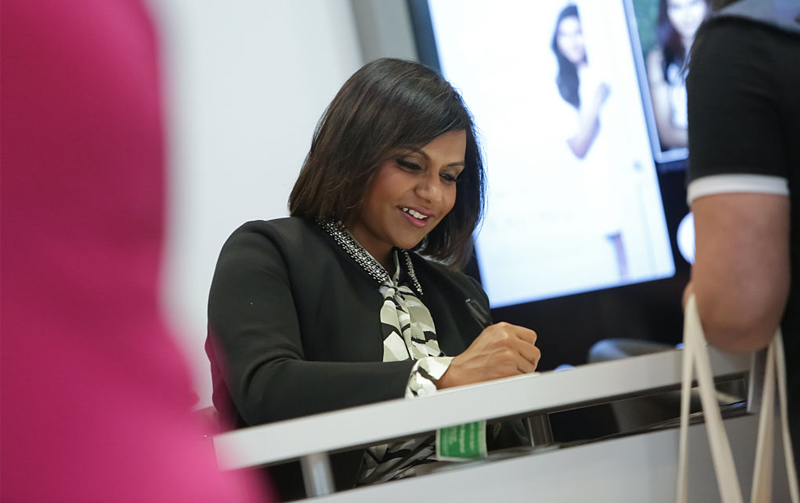Pretty much everyone aspires to be Mindy Kaling’s best friend. If you don’t believe us, then you’re obviously not spending enough time browsing the comments section of her social media posts. Mindy Kaling rose to fame acting in and writing for the long-running sitcom, The Office, and has since gone on to create and star in another comedy, The Mindy Project. She wrote the comedic memoir Is Everyone Hanging Out Without Me? (And Other Concerns) in 2011, and her second book, Why Not Me?, easily would have converted us into huge fans if we were not already devotees of the WWMD (What Would Mindy Do) way of life.
Among other witty moments of self-reflection in her book, Kaling describes herself as a “vampire” and “mole person” because of her daily schedule for the past 11 years. She explains, with photos, her average day, which begins at 5:00 am, ends at 12:30 am, and in between goes something like this: Wake up, shower, drive to work, hair and makeup, dress, rehearse and shoot, adjust script, lunch, brush teeth, pitch new stories, table read, hair and makeup, shoot, birthday cake, shoot, record voiceover, shoot, surreptitious nap, shoot, dinner, write, edit footage, go home, sleep, dream of cake.
If anything is clear, it’s that Kaling’s work ethic is a large reason for her success. (The Atlantic published an article on her book, calling it “a defense of something that has gotten a bad name: hard work.”) After reading the book, however, we were left with one question:Where did she find the time to write it in the first place?
Kaling is clearly driven and has a killer work ethic and excellent time management skills. But we can’t help but wonder if any part of the impetus (at least at the outset of her career) to work such relentless hours is tied in some way to her gender. Many women feel they have to do more to prove themselves at work than men do. One study found that 52% of women say that a major reason more women do not hold top leadership positions in business is because women are held to higher standards and have to do more to prove themselves, according to a report on women and leadership published by the Pew Research Center in 2015.
Furthermore, sociologists Julie Kmec of Washington State University and Elizabeth Gorman of the University of Virginia confirm that “[b]etween a man and a woman who hold the same job . . . the woman is likely to feel she must work harder.” Researchers Barbara Annis and John Gray, who authored Work with Me: Blind Spots Between Men and Women in Business,agree, saying that women “sense they have to work harder than men do just to prove themselves.” Kaling may well reject the notion that there is a correlation between her work ethic and these findings. All we know is that, whether or not being held to a higher standard has influenced how she approaches her job, there is no shortage of proof that she deserves all of her success.
There are two main (and related) messages that we took away from Why Not Me?, and both may well be answers to that very question. The first is that it’s okay to try. Kaling says, “I’ve never understood the compliment ‘effortless.’ People love to say: ‘She just walked into the party, charming people with her effortless beauty.’ I don’t understand that at all. What’s so wrong with effort, anyway? It means you care.”
Thank you! Working 17+ hour days doesn’t look easy because it’s not. Role models need to be something more than perfect specimens. Witnessing the way that someone overcomes adversity, reacts to a stressful situation or boosts herself up when the odds are against her can be just as instructive (we would argue more so) as trying to emulate someone who keeps her faults and shortcomings hidden away. We are so grateful for the mentors we’ve had who have acknowledged all of the hours of hard work that they’ve had to put in to be successful. Instead of feeling inadequate at those moments when we’re struggling, it’s inspiring to know that someone else has been where we are and has, through hard work, survived it. Or even that sometimes they’ve fallen short, because inevitably we will too.
From what we’ve witnessed, women disproportionally seem to feel the burden of having to be effortlessly perfect. At what point were we taught to minimize the demonstration of hard work? That your accomplishments are less impressive if they haven’t come easily? That humility is a greater virtue than unabashed self-confidence? Which brings us to the second message.
A general assumption about confidence is that women, particularly young women, will have very little of it, and girls have zero of it. Just the attitude alone makes me sad: “We have to help our girls and teach them to be confident.” Well, guess what, young girls. You aren’t damsels in distress. You aren’t hostages to the words of your peers. You aren’t victims that even your well-meaning teachers and advocates think you are.
This message is empowering. A battle does not have to be fought on our behalf. We are the agents of our own success. How cool is that? Perhaps most importantly, while confidence is something that can be earned, it is also something that must be claimed. Her advice is simple:
Work hard, know your s***, show your s***, and then feel entitled.
Hell, why not me?

